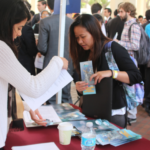How I Got Into Cornell University
The time was 4:55, the date December 8. I was five minutes away from the most important discovery in my life—whether or not I had been accepted to Cornell University’s Class of 2021. As you can probably tell from the title of this post, I got the news I wanted. Years of preparation, hard work, and waiting (so, so much waiting!) finally paid off. I was going to Ithaca in August, and I couldn’t have been more excited. Cornell has been a steady part of my life practically from birth. My parents met during their senior year at Cornell and, after graduation, remained engaged with the university as alumni. By the time I was old enough to understand the concept of college, I knew I wanted to go to Cornell (not for the reason you might think, though). Around that same time, I became steadfast in my goal of going into the hospitality industry—five-year old me was determined to “own a chain of five-star hotels.” Such a lofty goal would require an equally lofty education, and what better place to learn how to become a leader in the hospitality industry than the best hospitality management school in the country at (you guessed it) Cornell University? My mind was made up—I was going to Cornell’s Hotel School. Nearly a decade before my friends were finalizing their school lists, I knew exactly which school was at the top of my list. By the time I started high school, I had a roadmap for what I needed to do across my four years to practically guarantee my acceptance to Cornell. Here’s what it looked like. Want to learn what Cornell University will actually cost you based on your income? And how long your application to the school should take? Here’s what every student considering Cornell University needs to know. Throughout high school, I signed up for every honors and AP course that I could. My school was on the smaller side, so our options were fairly limited as underclassmen. During freshman year, the only higher-level course we could take was honors math. The following year, I was in three honors courses: math, chemistry, and Spanish. It was junior year when our options really expanded—we were allowed to take up to three AP courses. My schedule consisted of AP US History, AP English Language, AP Physics, Honors Spanish, and Honors Pre-Calculus. When selecting classes for senior year, I knew that my schedule had to be primarily composed of AP courses. I signed up for AP European History, AP Statistics, AP Macroeconomics, AP BC Calculus, and AP Chemistry, as well as an honors English course. I made the decision to not take Spanish, opting instead for AP Statistics which I felt was a better fit for me. Academic rigor is given significant consideration for admission to top schools—if you’re aiming high, don’t be afraid to work hard. Colleges want to see that you can handle a strenuous course load. The way they see it, students that challenge themselves in high school are likely to challenge themselves in college. When making your schedule, push yourself to pick classes that will challenge you academically and prove your grit to the schools you apply to. When it comes to the SAT and ACT, the best strategy is to start preparing as early as possible. I took a combined ACT/SAT practice test offered by my high school during sophomore year and decided that the ACT was more up my alley than the SAT, especially due to the changeover from the old SAT format to the new SAT format that launched during my junior year. I purchased a number of ACT preparation books and completed a bunch of practice tests throughout the summer and the first few months of my junior year. I sat for the ACT that December and exceeded my target score. While at the time I thought I was done with standardized tests, it turns out that I still had one more exam to take. My school required all juniors to take the PSAT in October, and while I had no intention of taking the SAT (I had already been studying for the ACT for a few months, and I knew nothing about the new format of the exam), I spent a few weeks preparing for the PSAT as best I could. In addition to serving as a dry-run for the real SAT, the PSAT is also the National Merit Scholarship Qualifying Test (NMSQT). Qualifying for a National Merit Scholarship would go a long way to strengthen my application to Cornell, so I wanted to do well on the PSAT. Due to the new format of the exam, scores for the PSAT weren’t released until January, after I had already gotten my ACT score back. I did better than I expected on the PSAT and ended up qualifying as a semifinalist for the National Merit Scholarship. To continue my application, I was required to submit an SAT score. I ended up sitting for the first administration of the new format of the SAT in March and received a score that allowed me to win a $2,500 National Merit Scholarship. The moral of the story is this: prepare for the PSAT—it can pay off (literally) down the line! When I was in seventh grade, an announcement was made one morning about an interest meeting for a school store club. Eager for opportunities to gain exposure to the business world, I made my way to the interest meeting only to find nobody else there. The principal, who was also expecting a more impressive turnout, invited me back to her office where she asked me to lay out my vision for the store. Three and a half years later, that vision became a reality when the Marketplace opened near the high school cafeteria. By the end of senior year, I was running a business with over 40 active employees who would work in the store during their free periods. Founding and running a business within my high school was by far my proudest accomplishment in high school (and didn’t look too bad on an application, either). I pursued a passion of mine and it paid off tremendously. In addition to running the school store, I was elected to Congress, my school’s student government, during freshman year and served all four years of high school. In senior year, I ran for an executive board position within Congress and became the Vice President. I enjoyed having the opportunity to work with administrators, faculty, and students to advance issues that were important to the student body and create new policies to strengthen the school community. My other major extracurricular involvement throughout high school was Model United Nations, or Model UN. From my first conference at Johns Hopkins during freshman year, to my last conference at Cornell during senior year, I loved every second I spent participating in Model UN. My closest friends from high school are still those who served on the executive board for the club. As the treasurer, it was my responsibility to handle all logistical matters related to our trips, including payment, bussing, and hotels (sensing a theme?). While it may seem like my extracurriculars were specifically curated to fit with my application to Cornell, that’s not really the case. I pursued activities that I enjoyed and excelled in. I sought out leadership roles in those activities and made the most out of my experiences. Had I selected activities simply for the way they would have looked on my college application, I likely would not have had such wonderful experiences. Seek out what makes you happy and what you’re good at—the rest will follow!
When it comes to Cornell’s Hotel School, having demonstrated work experience in the hospitality industry is really important. Over 80% of the students in my incoming class had work experience in either a hotel, restaurant, or tourism-related enterprise. I knew that securing a hospitality job was an essential step on my path to Cornell. I was fortunate to have a family connection that allowed me to get a rotational internship at a hotel in Manhattan during my junior year. I commuted into New York City every Saturday for a few months to work in a different department of the hotel and gain exposure to the many facets of keeping a hotel running—I even had the chance to work the front desk on a few occasions, which was particularly fun! One of the great things about the hospitality industry is that you absolutely don’t need a family connection to get a job. If the role at the hotel fell through, I could have applied for a job at a local restaurant as a busboy, server, or dishwasher—that would have qualified as work experience too. Like many large schools, Cornell has a number of summer programs specifically designed for high school students to experience college life while studying real material and earning college credits. Fortunately for me, one of those programs took place at the Hotel School. I knew that attending the summer program would be a great way to demonstrate my interest and passion for the Cornell. At the same time, it was a way for me to make sure that I enjoyed learning about hospitality as much in practice as I did in theory—before applying Early Decision, it was important to make sure I was comfortable signing a binding agreement to attend the school if I got in! I attended Cornell Summer College after junior year and had the time of my life. I loved everything about it—the wonderful people I met, the industry-specific material I learned, and the beautiful campus I lived on. The 3-week course was packed with homework assignments, group projects, and exams. While that may not sound so fun, succeeding in the course and earning a high grade was probably the best way to demonstrate that I belonged at the Hotel School come the following fall. Look for ways to keep yourself occupied in the summer, and if possible, try to attend a summer program at your top-choice school. It’s a great test-run before committing yourself to four years at a college and can certainly help you when it comes to admissions. When it came time to start my personal statement after returning from Summer College, I knew that I would be writing about what I learned from my many years running the school store. It was a perfect way to showcase my passion for business and demonstrate the knowledge I gained from my experience. I worked through a bunch of drafts and after a few weeks I was satisfied with the final product. Since I was applying Early Decision to Cornell, I knew that I would hear back during the first half of December. For better or worse, I decided to hold off on completing any other applications until I heard back. That meant I only had to write one more essay—my Hotel School supplement. This is the prompt I responded to: The global hospitality industry includes hotel and foodservice management, real estate, finance, entrepreneurship, marketing, technology, and law. Describe what has influenced your decision to study business through the lens of hospitality. What personal qualities make you a good fit for SHA [School of Hotel Administration]? I used this essay as an opportunity to tell my story—from my early passion for the hospitality industry to my internship at the hotel to my experience at Summer College, this was the link that brought all of the components of my application together. Use your supplemental essays as an opportunity to showcase your admissions theme: the central thread that runs through your application and tells a compelling story to admissions officers. I finalized my essays on the morning of October 9th. My Common App was finished, my recommendations had been submitted, my score reports were sent. I added my essays into the application, completed a final read-through, and submitted. The waiting game began—it would be two months until I received my decision. If you take nothing else away from this post, let it be that you should submit your applications as early as possible. Whether or not it’s true that some colleges only begin reading applications after the deadline has passed, getting your application to the top of the pile by submitting multiple weeks (if not months) before the deadline could mean the difference between an acceptance and a deferral, or even a rejection. Curious about your chances of acceptance to your dream school? Our free chancing engine takes into account your GPA, test scores, extracurriculars, and other data to predict your odds of acceptance at over 500 colleges across the U.S. We’ll also let you know how you stack up against other applicants and how you can improve your profile. Sign up for your free CollegeVine account today to get started!
High School Courses
Standardized Tests
Extracurricular Activities
Work Experience
Summer Plans
Essays
The Bottom Line




